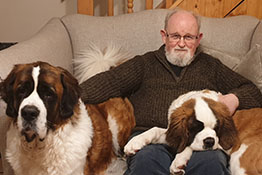How did your degree/experience at university help lead you into your current career?
Part One of the Social Sciences BA included Economics, Politics, Economic and Social History and Sociology. Economic and Social History fascinated me, then and since. I specialised in Politics in Part Two because I wanted to keep the History to myself – my own hobby and ideas – i was afraid that academic study would have taken the fun out of it. Politics I enjoyed – often on the streets, the 60s being an active time; hence the nickname ‘Trot’., though I was far more an anarchist than a Trotskyite. I taught Economics for a few years before becoming convinced that secondary education in UK is a pointless and valueless farce. I stopped teaching nearly forty years ago.
What drew me to Kent?
The prospect of being part of something new, of being one of the First 500. The most striking thing I remember about Kent is being almost the only working-class student there; my thick, agricultural deep-Hampshire accent stood out. The collegiate system offered some interesting experiences.
Can you tell us about your life after Kent?
I dropped out for three years, going across to France immediately after graduation. Paris was amusing in ’68. I wandered a while and met my wife and settled down, or attempted to, hence teaching. A few years of respectability and we took contracts in Papua New Guinea, where I ended up as a trainer and operational policeman with the Royal Papua New Guinea Constabulary. My children had the advantage of growing up in PNG.
My wife became ill and we returned to UK where she made a base and I worked contracts in Saudi and Libya; I returned to UK and worked in the security industry until she eventually died in 2003. After that, my son, daughter and I formed a unit and now live in a large house with four St Bernards and a mastiff. I wanted to write and took a job as a night watchman which gave me a living and a good ten hours a night free to try to write. In ten years I accumulated 90 rejection slips. In 2013 I decided that my latest book, the Privateersman, was of publishable quality and that the publishing industry was wrong. I self-published on Amazon and did not look back. I am now publishing ten books a year, all historical fiction and well-reviewed and importantly, selling! I earned six figures last year,
I love writing and spend typically 10 to 12 hours a day at the keyboard. I look to produce 3,000-4,000 words a day, and spend the spare time editing.
Published this weekend is the first in a series of 8 to 10 novels of about 90,000 words each set in the First World War, Falling into Battle. In a fortnight, the second of my English Civil War series, Years of Blood, comes out. After that, a Regency romance/spoof, A Pinchbeck Peer, Book 3 and then the 3rd book of the Colonial Warrior series, Billy Bacon and Tippoo’s Armies.
I tell stories – and a lot of readers enjoy them. Mostly, they are tongue in cheek, distinguished, I quote, by bone-dry wit and with a viewpoint that is well left of centre. As for style? On the same day three years ago a professor of Literature at a very minor American college compared me with the early Charles Dickens while a lady from England said i was ‘as good as Jeffrey Archer’; I don’t know which was the greater compliment.
I do know that I write because I cannot stop writing – I am driven by a happy compulsion.
In my spare time I also collect English Pressed Glass – another compulsion!

